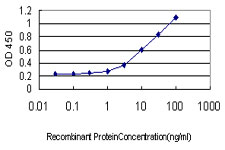ALDOB Antibody (monoclonal) (M01)
Mouse monoclonal antibody raised against a full length recombinant ALDOB.
- 产品详情
- 实验流程
- 背景知识
Application
| E |
|---|---|
| Primary Accession | P05062 |
| Other Accession | BC029399 |
| Reactivity | Human |
| Host | mouse |
| Clonality | monoclonal |
| Isotype | IgG2a kappa |
| Clone Names | 3B3 |
| Calculated MW | 39473 Da |
| Gene ID | 229 |
|---|---|
| Other Names | Fructose-bisphosphate aldolase B, Liver-type aldolase, ALDOB, ALDB |
| Target/Specificity | ALDOB (AAH29399, 1 a.a. ~ 316 a.a) full-length recombinant protein with GST tag. MW of the GST tag alone is 26 KDa. |
| Dilution | E~~N/A |
| Format | Clear, colorless solution in phosphate buffered saline, pH 7.2 . |
| Storage | Store at -20°C or lower. Aliquot to avoid repeated freezing and thawing. |
| Precautions | ALDOB Antibody (monoclonal) (M01) is for research use only and not for use in diagnostic or therapeutic procedures. |
For Research Use Only. Not For Use In Diagnostic Procedures.
Provided below are standard protocols that you may find useful for product applications.
BACKGROUND
Fructose-1,6-bisphosphate aldolase (EC 4.1.2.13) is a tetrameric glycolytic enzyme that catalyzes the reversible conversion of fructose-1,6-bisphosphate to glyceraldehyde 3-phosphate and dihydroxyacetone phosphate. Vertebrates have 3 aldolase isozymes which are distinguished by their electrophoretic and catalytic properties. Differences indicate that aldolases A, B, and C are distinct proteins, the products of a family of related 'housekeeping' genes exhibiting developmentally regulated expression of the different isozymes. The developing embryo produces aldolase A, which is produced in even greater amounts in adult muscle where it can be as much as 5% of total cellular protein. In adult liver, kidney and intestine, aldolase A expression is repressed and aldolase B is produced. In brain and other nervous tissue, aldolase A and C are expressed about equally. There is a high degree of homology between aldolase A and C. Defects in ALDOB cause hereditary fructose intolerance.
REFERENCES
The biochemical basis of hereditary fructose intolerance. Bouteldja N, et al. J Inherit Metab Dis, 2010 Apr. PMID 20162364.Increased prevalence of mutant null alleles that cause hereditary fructose intolerance in the American population. Coffee EM, et al. J Inherit Metab Dis, 2010 Feb. PMID 20033295.Secreted protein acidic and rich in cysteine (SPARC) gene polymorphism association with hepatocellular carcinoma in Italian patients. Segat L, et al. J Gastroenterol Hepatol, 2009 Dec. PMID 19817957.Five mucosal transcripts of interest in ulcerative colitis identified by quantitative real-time PCR: a prospective study. Eriksson A, et al. BMC Gastroenterol, 2008 Aug 12. PMID 18700007.Hereditary fructose intolerance: frequency and spectrum mutations of the aldolase B gene in a large patients cohort from France--identification of eight new mutations. Davit-Spraul A, et al. Mol Genet Metab, 2008 Aug. PMID 18541450.
终于等到您。ABCEPTA(百远生物)抗体产品。
点击下方“我要评价 ”按钮提交您的反馈信息,您的反馈和评价是我们最宝贵的财富之一,
我们将在1-3个工作日内处理您的反馈信息。
如有疑问,联系:0512-88856768 tech-china@abcepta.com.























 癌症的基本特征包括细胞增殖、血管生成、迁移、凋亡逃避机制和细胞永生等。找到癌症发生过程中这些通路的关键标记物和对应的抗体用于检测至关重要。
癌症的基本特征包括细胞增殖、血管生成、迁移、凋亡逃避机制和细胞永生等。找到癌症发生过程中这些通路的关键标记物和对应的抗体用于检测至关重要。 为您推荐一个泛素化位点预测神器——泛素化分析工具,可以为您的蛋白的泛素化位点作出预测和评分。
为您推荐一个泛素化位点预测神器——泛素化分析工具,可以为您的蛋白的泛素化位点作出预测和评分。 细胞自噬受体图形绘图工具为你的蛋白的细胞受体结合位点作出预测和评分,识别结合到自噬通路中的蛋白是非常重要的,便于让我们理解自噬在正常生理、病理过程中的作用,如发育、细胞分化、神经退化性疾病、压力条件下、感染和癌症。
细胞自噬受体图形绘图工具为你的蛋白的细胞受体结合位点作出预测和评分,识别结合到自噬通路中的蛋白是非常重要的,便于让我们理解自噬在正常生理、病理过程中的作用,如发育、细胞分化、神经退化性疾病、压力条件下、感染和癌症。






